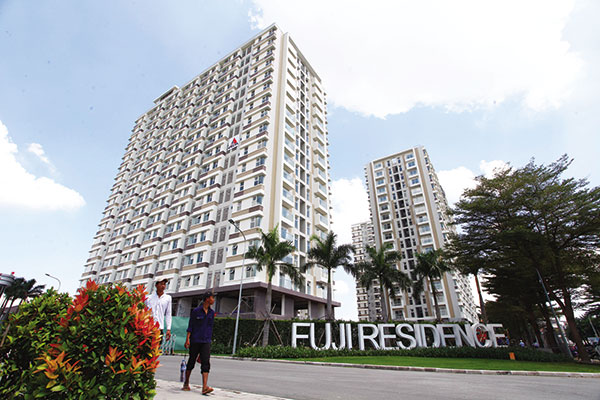Real estate results transfer to bourse
 |
| An enthusiastic property market has seen correlating growth in stock prices, Photo: Le Toan |
Sky-high prices
2018 is expected to be a good year for real estate stocks in Vietnam as investors make their way back to an industry that has been troubled with oversupply, price bubbles, and rampant speculation.
One catalyst for this revival is low valuation, according to Truong Hien Phuong, director at the Ho Chi Minh City Branch of KIS Vietnam Securities. Phuong pointed out that the price-per-earnings ratio of real estate stock now stands below 10, which is much below the Vietnamese average of 17 or 18. Savvy investors could make use of this opportunity to purchase stock at low prices.
Indeed, some investors have already noted this and taken action, causing a boom in stock prices. According to figures released by KIS Vietnam Securities, in 2017, more than 80 per cent of real estate stocks have risen by at least 50 per cent in market value, some by 200 per cent.
In notable cases, Dat Xanh Group’s (DXG) stock increased by 95 per cent; Van Phat Hung Corporation (VPH) grew by 96 per cent; Thu Duc House (TDH) rose by 87 per cent; FLC Corporation (FLC) increased by 31 per cent; and Nam Long Group (NLG) expanded by 54 per cent.
The number of listed companies in the real estate sector increased from 11 to 57 at the end of last year, the KIS report shows.
Long-term appeal
However, low prices alone are not enough. The majority of investors will only buy into cheap stocks if they believe in the growth potential of the companies issuing these shares. In this case, real estate firms in Vietnam must have strong prospects to retain their long-term appeal.
This growth potential seems likely to be fulfilled. Economist Bui Quang Tin said that the real estate industry is now backed by several supporting factors, including the country’s good macro-economics, a stable interest margin, and an increasing amount of inbound foreign capital. These are necessary for the sector’s sustainable growth.
“The economy is on the right track, individuals’ savings are bigger, which supports the growth of real estate firms. And unlike before, real estate developers are now offering more suitable products to the market, making them easier to sell,” said Tin.
He believed that stocks of leading developers will continue their winning streak in 2018.
Vietnam’s growing middle class and rapid urbanisation are also cited as aiding realty growth, as noted in a recent report by Vu Huu Dien, fund manager at Dragon Capital. In 2017, the percentage of real estate stock in Dragon Capital’s Vietnam Enterprise Investment Limited (VEIL) increased from 13 to 17.6 per cent. This is partly attributable to the strong performances of current holdings, and VEIL’s participation in the share sales of major developers like IDICO and Becamex IDC.
Last month, Dragon Capital also became Hai Phat Investment JSC’s strategic partner with a 15 per cent stake purchase. At the same time, other two undisclosed foreign funds were reported to have engaged in three stock purchases with the real estate field Van Phu Invest.
Real estate is also an industry of focus in 2018 for VinaCapital’s main fund Vietnam Opportunity Fund (VOF), as the investor believes that this sector will benefit from Vietnam’s ongoing urbanisation and economic growth. VOF used to invest directly in real estate projects, but has now switched to a more indirect approach by buying into listed firms in property.
Opportunities are not for everyone
It is important to note that despite the sector’s rosy perspective, not all firms in real estate will become diamonds in investors’ eyes. The attention will be reserved for companies with a wide land fund, strong experience, and good business development capacity, said Savills Vietnam’s investment director Su Ngoc Khuong.
Firms engaging in mergers and acquisitions (M&As) may also attract the attention of investors. Khuong highlighted that stocks of Quoc Cuong Gia Lai JSC have increased by 300 per cent and Phat Dat Real Estate Development JSC boomed by 187 per cent after both companies conducted M&As and developed projects on their own.
“When the acquiring projects are eyed by major domestic and foreign firms, companies with big land banks would be at the greatest advantage. In the current busy M&A scene, with sellers dominating the market, those with land banks are in the best position,” Khuong said.
What the stars mean:
★ Poor ★ ★ Promising ★★★ Good ★★★★ Very good ★★★★★ Exceptional
Latest News
More News
- An Phat 5 Industrial Park targets ESG-driven investors in Hai Phong (January 26, 2026 | 08:30)
- Decree opens incentives for green urban development (January 24, 2026 | 11:18)
- Public investment is reshaping real estate’s role in Vietnam (January 21, 2026 | 10:04)
- Ho Chi Minh City seeks investor to revive Binh Quoi–Thanh Da project (January 19, 2026 | 11:58)
- Sun Group launches construction of Rach Chiec sports complex (January 16, 2026 | 16:17)
- CEO Group breaks ground on first industrial park in Haiphong Free Trade Zone (January 15, 2026 | 15:47)
- BRIGHTPARK Entertainment Complex opens in Ninh Binh (January 12, 2026 | 14:27)
- Ho Chi Minh City's industrial parks top $5.3 billion investment in 2025 (January 06, 2026 | 08:38)
- Why Vietnam must build a global strategy for its construction industry (December 31, 2025 | 18:57)
- Housing operations must be effective (December 29, 2025 | 10:00)
















 Mobile Version
Mobile Version